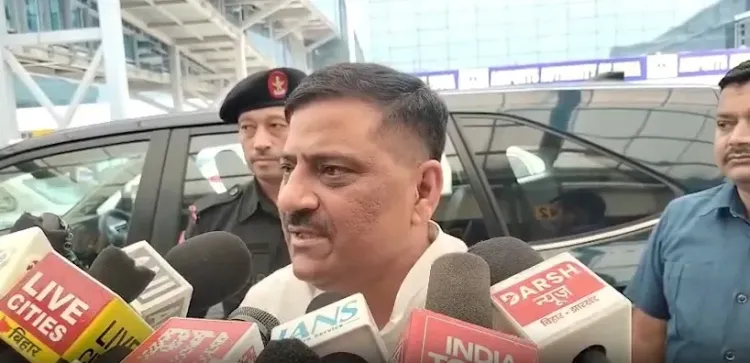Why Is It Crucial to Expose Pakistan's Proxy War Against India?

Synopsis
Key Takeaways
- India is committed to exposing Pakistan's proxy war against it.
- Operation Sindoor marks a significant shift in India's military response.
- Multi-party collaboration is crucial for India's diplomatic efforts.
- International support is essential to combat terrorism.
- Recent attacks have heightened India's resolve against cross-border terrorism.
New Delhi, May 21 (NationPress) Janata Dal (United) MP Sanjay Jha emphasized the urgent need to unveil Pakistan's longstanding "proxy war" against India, as this rogue state continues to incite cross-border terrorism.
On Wednesday night, he will depart for Japan, leading a multi-party delegation as part of India's diplomatic initiative to counter terrorism and emphasize the strategic importance of Operation Sindoor.
Joining him are MPs Aparajita Sarangi and Brij Lal from the BJP, Abhishek Banerjee and John Barittas from the Trinamool Congress, and Salman Khurshid from the Congress. They will engage in a high-level mission across five crucial East and Southeast Asian countries -- Japan (May 22), South Korea (May 24), Singapore (May 27), Indonesia (May 28), and Malaysia (May 31).
In an interview with IANS, Jha stated, "There are two things. First, the country has been facing terrorism for decades. This terrorism has always come from across the border from Pakistan. This is not a hidden fact."
"In the past, whether it was the 2008 Mumbai attacks or the Pulwama attack, India has always shared information and invited them to participate in investigations. But if we share data with the thief, can we expect justice? The Pakistan government itself finances the terrorists, trains them through its military, and orchestrates these attacks. This is akin to a proxy war against India," he asserted.
Referring to the recent military operations, he remarked, "Now India has made it clear through Operation Sindoor that enough is enough. Nine terrorist camps were entirely obliterated by our Air Force. The evidence is undeniable. Even a state funeral was held for the terrorists killed in Operation Sindoor, attended by Pakistani Army personnel."
Jha reaffirmed India's robust stance, declaring, "As Prime Minister has stated, Operation Sindoor is the new normal. India will not tolerate terrorism and will continue its battle to eradicate it from the roots."
Expressing gratitude towards the government for uniting leaders across political lines, he added, "We thank the Prime Minister for including leaders from all political backgrounds in these seven delegations. India stood united during Operation Sindoor, representing not just the government or the Opposition, but all of India."
This global initiative follows the April 22 terror attack in Pahalgam and India's decisive military and diplomatic response. India is dispatching seven delegations to 25 nations to present evidence of Pakistan's involvement in cross-border terrorism and to reinforce India's zero-tolerance approach.
Alongside Jha's team, another delegation led by MP Shrikant Shinde will visit the UAE, Congo, Sierra Leone, and Liberia. Additionally, a third group headed by DMK leader Kanimozhi will commence their mission on Thursday, traveling to Russia, Slovenia, Greece, Latvia, and Spain.
These delegations, comprising leaders from various political parties and supported by senior diplomats, are tasked with delivering India's clear and firm message against terrorism while fostering international cooperation to combat this threat.










